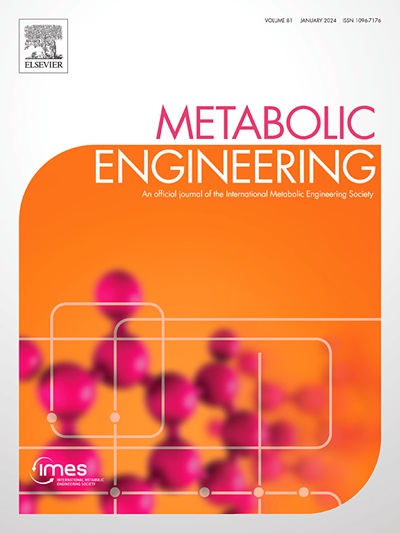Engineering Komagataella phaffii to produce lycopene sustainably from glucose or methanol
IF 6.8
1区 生物学
Q1 BIOTECHNOLOGY & APPLIED MICROBIOLOGY
引用次数: 0
Abstract
Lycopene, a potent carotenoid with high antioxidant capacity and extensive applications, holds significant potential for sustainable production via microbial engineering, particularly with the rising interest in methanol as an ideal non-grain feedstock for a carbon-negative economy. In this study, Komagataella phaffii was systematically engineered to enhance lycopene production using glucose and renewable methanol as alternative carbon sources. Firstly, we demonstrated that the cytoplasmic FPP could penetrate into the peroxisome, and thus achieved the dual-localized lycopene synthesis. Subsequently, the cytoplasmic FPP pool was expanded by dynamically regulating squalene synthase and enhancing the mevalonate pathway, and FPP was redirected to lycopene synthesis via assembling critical enzymes. Furthermore, the synthesis of lycopene from methanol was improved by reprogramming the methanol metabolic pathway. In the above process, we found that the engineered strains would degrade significantly in the process of passing culture. Comparative transcriptomic analysis revealed that nitrogen metabolism genes contributed significantly to strain degeneration, and a gene (PAS_chr2-2_0003) that positively influenced lycopene synthesis was identified. Finally, two strains were successfully engineered: strain zw327, which produced 8.4 g/L lycopene from glucose, and strain zw352, which achieved 10.2 g/L from methanol and glycerol. The latter represents the highest reported titer from methanol to date, underscoring the potential of K. phaffii as a robust one-carbon platform for industrial terpenoid biosynthesis.

利用葡萄糖或甲醇可持续生产番茄红素。
番茄红素是一种有效的类胡萝卜素,具有高抗氧化能力和广泛的应用,通过微生物工程具有可持续生产的巨大潜力,特别是随着甲醇作为碳负经济理想的非谷物原料的兴趣日益增加。在这项研究中,系统地设计了Komagataella phaffii,以葡萄糖和可再生甲醇作为替代碳源,以提高番茄红素的产量。首先,我们证明细胞质FPP可以渗透到过氧化物酶体中,从而实现双定位的番茄红素合成。随后,细胞质FPP池通过动态调节角鲨烯合成酶和增强甲羟戊酸途径而扩大,FPP通过组装关键酶被重定向到番茄红素合成。此外,通过对甲醇代谢途径的重新编程,改进了甲醇合成番茄红素的工艺。在上述过程中,我们发现工程菌株在传代培养过程中降解明显。比较转录组学分析显示,氮代谢基因对菌株退化有显著影响,并鉴定出一个积极影响番茄红素合成的基因(PAS_chr2-2_0003)。最终,菌株zw327从葡萄糖中获得8.4 g/L的番茄红素,菌株zw352从甲醇和甘油中获得10.2 g/L的番茄红素。后者是迄今为止从甲醇中报道的最高滴度,强调了菲氏梭菌作为工业萜类生物合成的强大单碳平台的潜力。
本文章由计算机程序翻译,如有差异,请以英文原文为准。
求助全文
约1分钟内获得全文
求助全文
来源期刊

Metabolic engineering
工程技术-生物工程与应用微生物
CiteScore
15.60
自引率
6.00%
发文量
140
审稿时长
44 days
期刊介绍:
Metabolic Engineering (MBE) is a journal that focuses on publishing original research papers on the directed modulation of metabolic pathways for metabolite overproduction or the enhancement of cellular properties. It welcomes papers that describe the engineering of native pathways and the synthesis of heterologous pathways to convert microorganisms into microbial cell factories. The journal covers experimental, computational, and modeling approaches for understanding metabolic pathways and manipulating them through genetic, media, or environmental means. Effective exploration of metabolic pathways necessitates the use of molecular biology and biochemistry methods, as well as engineering techniques for modeling and data analysis. MBE serves as a platform for interdisciplinary research in fields such as biochemistry, molecular biology, applied microbiology, cellular physiology, cellular nutrition in health and disease, and biochemical engineering. The journal publishes various types of papers, including original research papers and review papers. It is indexed and abstracted in databases such as Scopus, Embase, EMBiology, Current Contents - Life Sciences and Clinical Medicine, Science Citation Index, PubMed/Medline, CAS and Biotechnology Citation Index.
 求助内容:
求助内容: 应助结果提醒方式:
应助结果提醒方式:


